‘You put in the time, energy, and resources to be worthy’
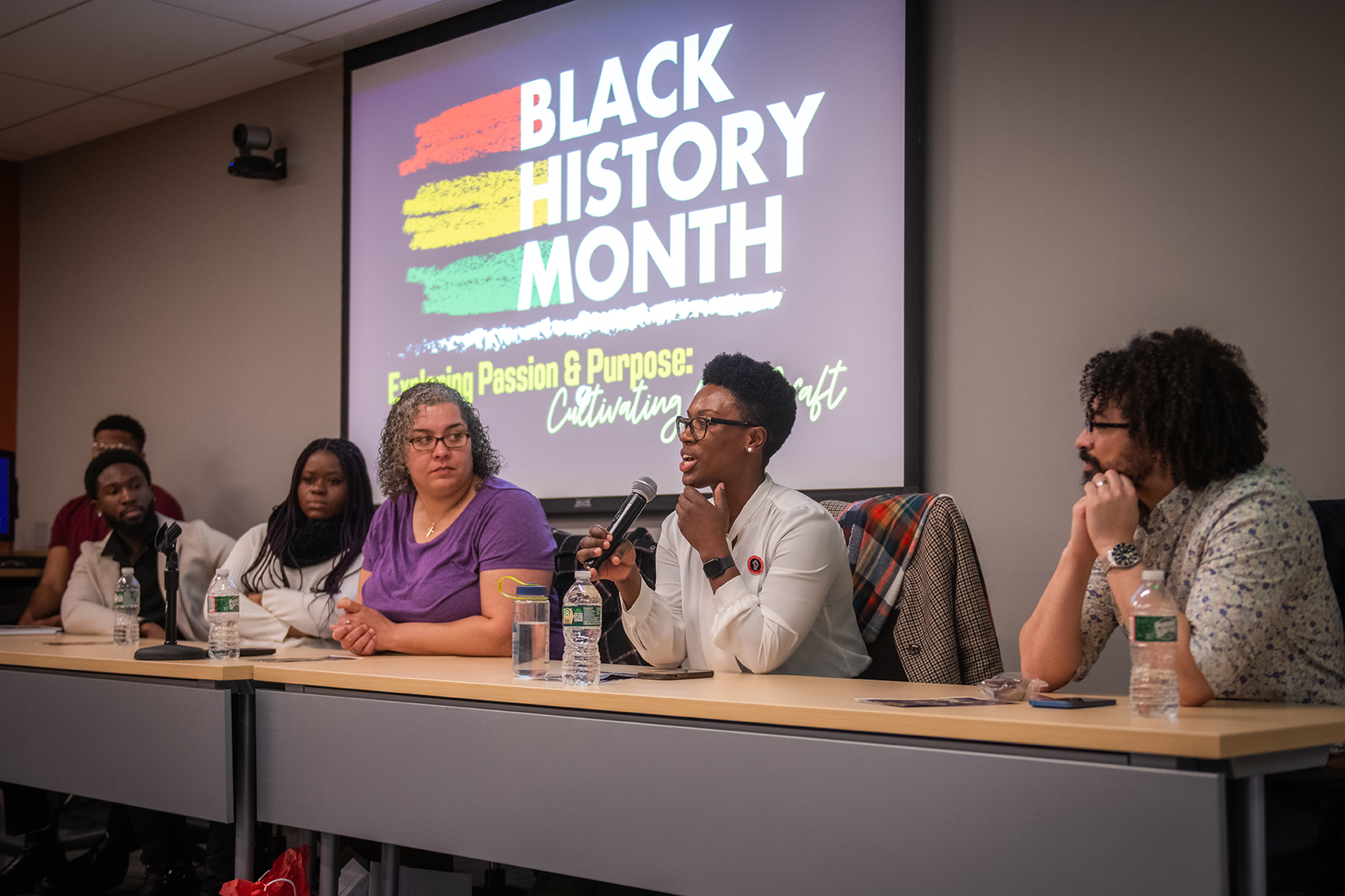
Seek out mentors.
Find work that fulfills you.
Be a resource for others.
And network, network, network.
These were among the life and career lessons offered to Clark students of color by alumni of color at the Panel on Passion and Purpose, a highlight of Black History Month, held Feb. 23 in the Shaich Family Alumni and Student Engagement Center.
Over the course of a 90-minute conversation hosted by Aidan Hilaire ’26 and Tapuwa Kabaira ’25, the panelists answered questions about their journeys, from their Clark student days to their successes and struggles as young professionals. Serving on the panel were Luke Blackadar ’11, attorney for the Arts & Business Council in Boston and a lecturer at several colleges; Gloria Agossou ’22, assistant planner with the Central Massachusetts Regional Planning Commission; Briana “Bri” Azier ’05, CEO and owner of Bri’s Sweet Treats; Dr. Stacey Lawrence ’08, director for STEM initiatives for the Harriet W. Sheridan Center for Teaching and Learning at Brown University; and Biko Gayman ’21, MHS ’22, behavioral education and development specialist at Bradley Hospital (Providence, R.I.), and chief operating officer of Be Great Academy.
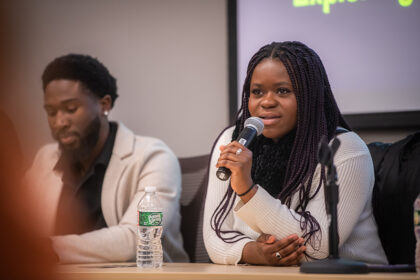
The wide-ranging discussion began with the panelists recalling their early challenges of adjusting to life on campus. Agossou and Blackadar, who both grew up in predominantly white New England towns, said they found immediate community at Clark in organizations like the Black Student Union and the Caribbean and African Student Association.
“BSU and CASA opened up new spaces for me that didn’t exist in Auburn, Maine,” Agossou said.
“When I got involved in BSU, it was the first time I was seeing people who looked like me, which was a little disorienting and intimidating,” Blackadar said. “But BSU was unbelievably welcoming. It didn’t matter if you didn’t share the same cultural identity; you were among family here.”
Gayman and Lawrence, who both grew up in predominantly Black neighborhoods, found few people of color in their Clark science courses, a clear contrast to their social circles on campus. “[Clark] was great outside the classroom, and a challenge inside the classroom,” Lawrence said.
The panelists spoke of the passions that drive them in life and work. “My curiosity drives my purpose,” Lawrence said, adding that “being a good person and helping people along the way leads you into really interesting spaces.”
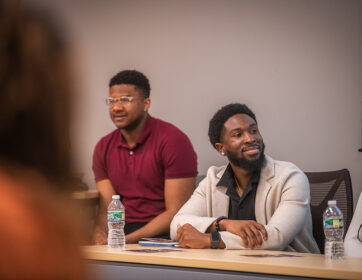
Mentorship is the “connective tissue” for Blackadar, whose work with junior professionals reminds him of the teachers in his personal and professional life who “led me to seismic shifts with what I thought I’d do with my life.”
Azier — whose business logo contains four hearts signifying her guiding forces of faith, family, community, and friends — noted that “my business is not about selling candy. It’s about a legacy of giving back and making the community better. I need to make a million dollars to give a million dollars.”
The award-winning candymaker said she’s committed to supporting other Black entrepreneurs, especially women, and “pulling up the people” who are hungry for opportunity and seeking similar success.
Asked about challenges they faced coming out of college, Agossou described the “decision fatigue” that can result when faced with many choices. It’s a phenomenon corroborated by several of her fellow panelists.
“Be patient, and the right thing will come for you at the right moment,” Gayman advised the students. “Keep showing up and doing the work, be consistent with it, even when your motivation is running out.”
Blackadar said it can be difficult to focus on the specific craft you want to pursue when you have multiple passions, noting that he enjoys both his full-time job of counseling business owners and his part-time occupation of teaching the next generation of lawyers.
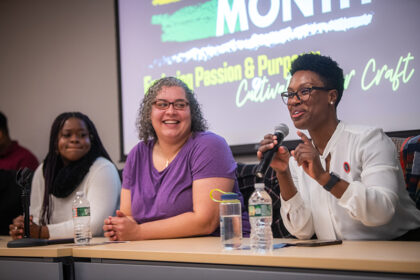
Lawrence said she found herself shifting identities, depending on the day, to fit into a specific setting or situation. “Do I choose my science identity today? Do I choose my Black woman identity today?” she remembers asking herself. “You’ve got to be at peace with what you choose.” Today, she said, she brings her “whole self” to any situation and space, “and at least I go home feeling good about myself at night.”
The panelists acknowledged grappling with “imposter syndrome” at one time or another.
A person can combat that anxiety by “surrounding yourself with people who remind you that you are not an imposter,” Lawrence said. “You earned that.”
Agossou concurred, saying that having a solid support system of friends who remind you of your strengths and successes is key to overcoming doubts.
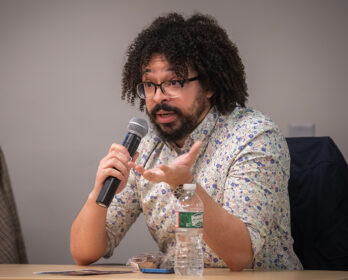
Blackadar said he didn’t experience imposter syndrome while at Clark, but that feelings of insecurity can percolate throughout anyone’s career. “It never really goes away, and that’s okay, because you’re still learning new things.”
“I have to toe the line of cocky and confident,” Azier said. “Imposter syndrome comes when you’re good at something and you still ask, ‘Am I really worthy?’ Remind yourself that you put in the time, energy, and resources to be worthy.”
The panelists concluded with advice for the students about pursuing their lives post-Clark. They agreed that networking is critical to making headway in one’s career.
“I only got jobs and internships through networking,” Lawrence said. She gently challenged the students in the room to network with the panelists at a reception following the Q&A.
“Networking gets you into rooms and spaces,” said Gayman, who also stressed the need to learn from mentors “who are doing what you want to do.” It’s okay to have different mentors for different needs, Blackadar said. “You can have a family of mentors.”
“Your network is your net worth,” said Azier, who stressed the importance of cultivating relationships, joining professional organizations, and becoming a known presence in your field of endeavor.
Agossou also advised the students to be serious about their physical health, from getting enough rest to having regular check-ups. Self-care, she said, “contributes to your success.”
The Panel of Passion and Purpose was sponsored by the Office of Identity, Student Engagement, and Access, the Black Student Union, and the Student Alumni Relations Committee.


